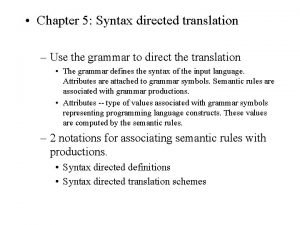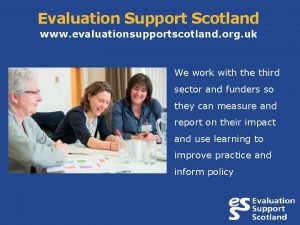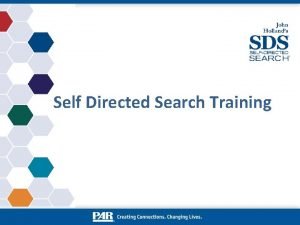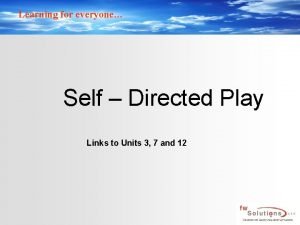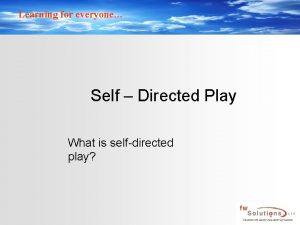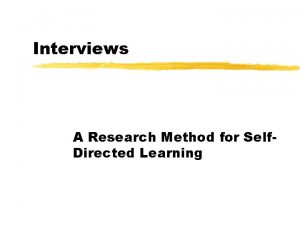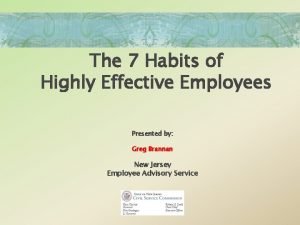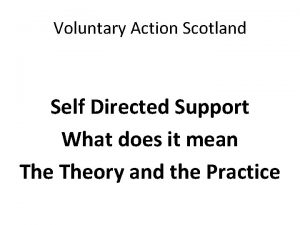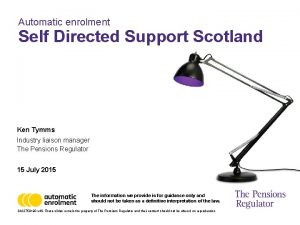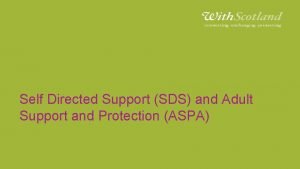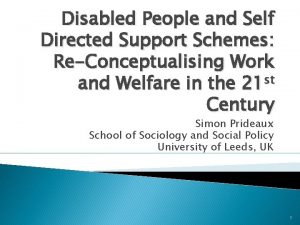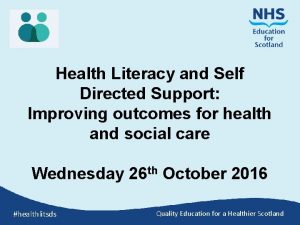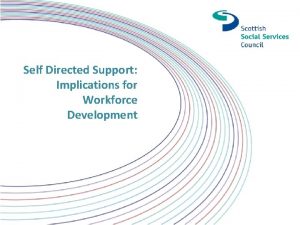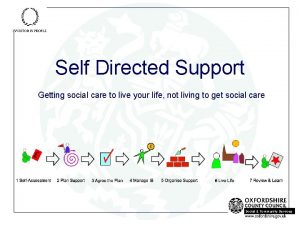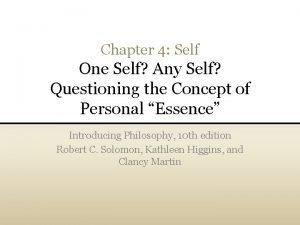Self Directed Support in Scotland The Story so





















- Slides: 21

Self Directed Support in Scotland: The Story so Far Mark Han-Johnston EVOC ‘SDS - are we there yet? ’ Thursday 28 th September 2016

Who are Self Directed Support Scotland • Self Directed Support Scotland (SDSS) is a national membership organisation • We are a User-Led, Disabled People’s Organisation (DPO) (A majority of our Board Members are disabled people from disabled person’s organisations) • We are part of the Independent Living Movement in the UK • We actively promote Independent Living by supporting, working with and championing the aims of Self Directed Support disabled people's organisations (SDS-DPOs)

What we do: • Raise awareness of Self Directed Support and the principles behind it • Promote the Social Model of Disability and the philosophy of the Independent Living Movement • We develop resources, materials and training for our member organisations • Research best practice, identify examples of good practice in SDS and report back to member organisations and others • Provide a national campaigning voice for member organisations • Work with other local and national organisations and agencies • We also work with Local Authorities, NHS Health Boards and Health and Social Care Partnerships / Integrated Joint Boards to raise awareness of SDS practise and implementation

The picture across Scotland

Implementation of Self Directed Support: • SDS 10 year National Strategy (2010 – 2020) • Social Care (Self-directed Support) (Scotland) Act 2013 • Statutory Guidance to accompany the above Act (March 2014) • Created new expectations in the delivery of social care • Central themes of personalisation, co-production and an outcomes focus • Created new legal duties for Local Authorities (eg ‘facilitate the person’s dignity and participation in the life of the community’; offer the 4 options; signpost)

Scottish Government Statistics for SDS: 2014 - 2015 Implementation • The best estimate of an implementation rate suggests that clients who made a choice represented 20% of all social care clients in 2014 -15 (80% no choice made? ) • The implementation rate was higher amongst younger clients (aged under 65) than amongst older clients (aged 65+) Client Analysis • The best estimate of the breakdown of SDS option choices in 2014 -15 is: 13% Option 1; 9% Option 2; 75% Option 3; and 3% Option 4 • The vast majority (88%) of clients aged 65+ chose Option 3, whereas under 65 s were more likely to choose Option 1 or 2 Expenditure • At least £ 250 m of expenditure was budgeted for social care clients who had made a choice regarding their services and support in 2014 -15 (20% of the all people? ) • On average, Option 3 care packages were of a lower value than Option 1 or Option 2 packages (Lower value = lower cost? )

This Report also highlights: • Only 20 out or 32 Local Authorities could give figures for the number of people on each of the 4 options of SDS • For 37% of people recorded on option 3 – it was not known what type of need their service was meeting (eg Housing, Personal Care etc) • There is an assumption that people on option 1 made a choice for this – which SDSS research has shown is not always the case • Different Local Authorities have different definitions of what constitutes an Option 2 service • There is no comparison between the amount of money spent on social care services prior to SDS implementation – no way of knowing if more or less is being spent • There is no comparison with the number of people eligible for social care funded support before SDS implementation

Where SDS is working well in Scotland: ? • There is no systematic way to know • There is not enough evidence to say that good practise is embedded in SDS implementation • It is not possible to say that Local Authorities meet their statutory duties under the SDS legislation • There are examples of good practise – certain teams / individuals etc • There is far more evidence of SDS not working as intended across the whole of Scotland

Weather Forecast for SDS: There may be trouble ahead • There has been some stormy weather • It’s likely to get wetter • There will be a few gales • There are some bright spots on the horizon

Some of the Issues that people face

(1) Postcode Lottery: • You may receive a different level of service and support depending on where you live • You may receive more money as a budget under Option 1 in one place, and less in another (But your needs are the same) • There may be varying degrees of understanding of SDS in different places • Some people may not even be told of SDS • It may be difficult to move to another area and get the same level of support

(2) Challenges to accessing SDS: • Lack of awareness of SDS • Lack of training for Local Authority staff on SDS • People being given incorrect information – dissuades people from applying for SDS • Reductions in Local Authority budgets – the on-going reduction of people’s care packages / budgets • Stricter interpretation of eligibility criteria – and applying this to Support Plans and activities people choose to undertake • Lack of a transparent and open system for allocating an appropriate budget to meet identified needs • Inequality of access to SDS for different groups of people • Local Authorities not undertaking assessments timely - if at all (for SDS and Carers)

(3) Challenges when receiving SDS: • People being given incorrect information • Lack of effective co-ordinating and communicating service provision between Education, Health, Housing and Social Work • Difficulty in getting jointly funded packages of care under SDS • Lack of access to Independent support (from Disabled People’s organisations and advocacy) • Difficulty getting agreement to use budgets flexibly and being risk positive • Lack of an Option 2 choice

It’s no longer them and us – it’s just us’ Collaborative Practise in Assessment Research • ‘The relationship between the assessor and the assessed person is the foundation – it’s so important. It needs good communication – especially good listening – and honesty. Processes and systems should be built around this and enable it, rather than getting in the way. ’

It’s no longer them and us – it’s just us’ Findings: • A climate of openness was created when people can come together to review SDS • Assessors are experiencing differing degrees of financial pressure • In practise, people using SDS and practitioners experiences differ significantly because of this financial pressure • The relationship between people using SDS and the assessor has come under strain because of the financial pressure • Assessors can struggle to be honest with their employer about the reality of SDS implementation

It’s no longer them and us – it’s just us’ Conclusions: • Introducing SDS at a time of austerity has put pressure on front line practitioners – who are encouraging people to make choices but are also being asked to cut people’s budgets • There is variation in the quality of workers practice • The ‘system’ created to deliver SDS is a major issue in preventing the delivery of SDS • It is possible to work in holistic, creative, preventative ways which reduce cost, prevent crisis and delay deterioration (Co-production)

SDS in Edinburgh: Some of the challenges: • Guiding people to block contracted services first • Not funding alternative therapies and counselling • Not paying for activity costs • Not being able to choose the gender of the person supporting you • Pushed to move to Option 1 if service identified is not satisfactory in some way • Activities in Support Plans being ‘reassessed’ against eligibility criteria • SDS not being for certain groups (eg homeless)

The Overall Challenge:

Support, information and further advice: SDS Information and Support Services across Scotland: • www. sdsinfo. org. uk Self Directed Support Scotland (SDSS): • www. sdsscotland. org. uk Not-for-profit support providers in your local area across Scotland: • www. searchforsupport. org SDS National Guides • (for service users, carers and practitioners) www. guidance. selfdirectedsupportscotland. org. uk Scottish Government and SDS: • www. selfdirectedsupportscotland. org. uk

Contact details: • Mark Han-Johnston: • Capacity Building and Resource Co-ordinator • Self Directed Support Scotland Norton Park 57, Albion Road Edinburgh EH 7 5 QY • Tel: (0131) 475 2625 • Mob: 07775 065653 • Email: mark@sdsscotland. org. uk

Thank you for listening:
 Self directed support options
Self directed support options Syntax directed translation example
Syntax directed translation example Actual self and ideal self similarities
Actual self and ideal self similarities Evaluation support scotland
Evaluation support scotland Sds assessment booklet
Sds assessment booklet John l holland
John l holland Self directed play
Self directed play Personally directed play
Personally directed play Self-directed play
Self-directed play Interview questions for self-directed learning
Interview questions for self-directed learning Grammatical signals examples
Grammatical signals examples 7 habits of highly disengaged employees
7 habits of highly disengaged employees Hình ảnh bộ gõ cơ thể búng tay
Hình ảnh bộ gõ cơ thể búng tay Ng-html
Ng-html Bổ thể
Bổ thể Tỉ lệ cơ thể trẻ em
Tỉ lệ cơ thể trẻ em Gấu đi như thế nào
Gấu đi như thế nào Tư thế worms-breton
Tư thế worms-breton Hát lên người ơi alleluia
Hát lên người ơi alleluia Môn thể thao bắt đầu bằng từ đua
Môn thể thao bắt đầu bằng từ đua Thế nào là hệ số cao nhất
Thế nào là hệ số cao nhất Các châu lục và đại dương trên thế giới
Các châu lục và đại dương trên thế giới

